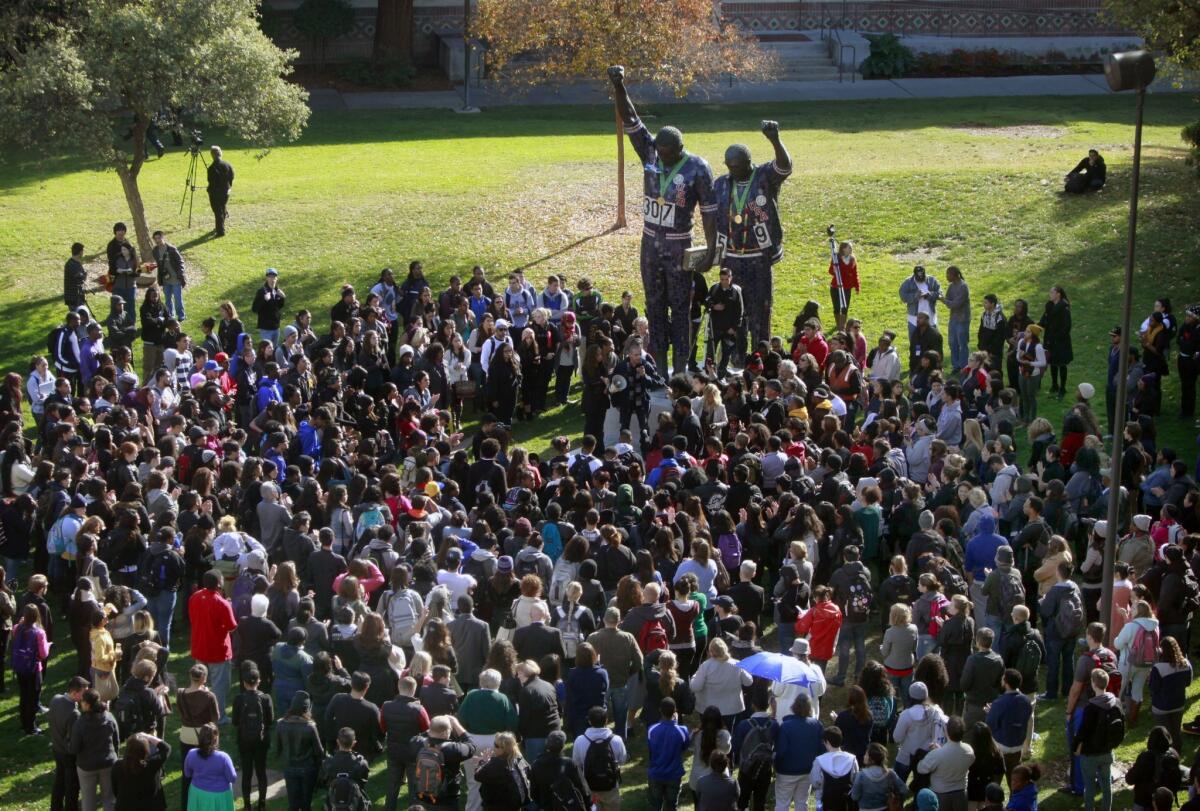San Jose State president admits mistakes, pledges collaboration

- Share via
It has a been a year of controversy and scrutiny at San Jose State University, capped with the concession from President Mohammad Qayoumi that after only three years as the campus leader he has angered faculty, staff and students and created a climate of mistrust.
The mea culpa came in a joint letter to the campus community on May 8 from Qayoumi and Cal State Chancellor Timothy White acknowledging problems of governance at the 30,000-student campus and outlining a series of policy changes.
“The improvements will take time and I ask for your support and your collective commitment to ‘right the ship’ and return SJSU to its rightful place as the great institution of learning we all believe it is and must always be,” Qayoumi said in the statement.
Qayoumi was not available to comment. His statement included no time frame for the changes. White, however, suggested he wanted to see swift action.
“I encourage the plan for SJSU to have metrics, timelines and a foci of responsibility and accountability,” White said in the letter. “It will serve as a guide to campus activities in these dimensions and will help inform my periodic review of SJSU, which in turn informs the CSU Board of Trustees.”
After Qayoumi was appointed to lead the Silicon Valley institution in March 2011, he quickly launched a set of initiatives to enhance the university’s profile that included upgraded campus classrooms and labs, improved technology and an aggressive move to adopt online learning.
One of the goals was more collaborative planning, but faculty quickly began to chafe at what they criticized as Qayoumi’s top-down management style.
Many faculty complained they had little input before the university -- with much fanfare -- entered into an ultimately problematic collaboration with the for-profit online education provider Udacity. Protests erupted over plans to reduce the size of the African American studies department and last minute-program cuts ordered by Qayoumi (which were subsequently canceled).
And the university was rocked by allegations late last year that a black freshman had endured weeks of racial harassment at the hands of some of his white roommates.
Qayoumi took personal responsibility for the failure of the campus to stop the alleged harassment earlier.
In November, the campus Academic Senate asked White to intervene and review the institution’s leadership.
White made several visits and a three-person study team spoke to more than 90 people, Cal State spokesman Mike Uhlenkamp said Tuesday.
White made no recommendations but has endorsed Qayoumi’s action plan, which includes a stronger process of consultation, strengthening the role of the president’s cabinet as well as that of the provost and vice president of academic affairs and establishing a budget advisory committee.
Qayoumi will have to work hard to renew faculty morale and trust, said Jonathan Karpf, who teaches biological anthropology at San Jose State and is a member of the California Faculty Assn.
“If the president follows through with all of his suggestions for improving relationships with the faculty, staff and students it will go a long way to addressing our concerns,” Karpf said.
San Jose State’s experiment with Udacity to offer online remedial math, algebra, elementary statistics and other courses was vastly scaled back after many students failed the classes.
Many faculty groups used the contentious project as proof that universities around the nation were rushing headlong to adopt online learning with little evidence of its benefits for students.
On Tuesday, a coalition of faculty organizations cast their arguments in a medium that will surely be relatable to online providers, releasing an animated video that criticizes the industry.
The video by the Campaign for the Future of Higher Education is meant to challenge claims that online learning and so-called massive open online courses -- MOOC’s -- will dramatically expand access to higher education and is more cost-effective.
It follows a series of reports from the faculty groups questioning the profit motive of such for-profit ventures as Coursera and Udacity. Another of the more prominent providers, edX, a platform launched by Harvard and MIT, is nonprofit.
“The hype that has accompanied the online push has been so overblown,” said Lillian Taiz, president of the California Faculty Assn. “So many students and universities have been suckered into expenditures, commitments and contracts and the next thing you know you have online degree programs put into place without discussion.”
The faculty groups challenged Coursera co-founder Daphne Koller, Udacity Chief Executive Sebastian Thrun and edX President Anant Agarwal to a public debate to address issues raised in the video.
Agarwal said he would take the groups up on their offer. He said that online classes have the potential to reach millions of students who don’t have access to bricks-and-mortar colleges.
And research suggests that educators can improve the efficiency of learning using online technologies, he said.
“The key here is how do you get evidence of what’s best,” Agarwal said. “That evidence doesn’t come by itself, you have to go out and experiment and do the research.”
More to Read
Sign up for Essential California
The most important California stories and recommendations in your inbox every morning.
You may occasionally receive promotional content from the Los Angeles Times.











